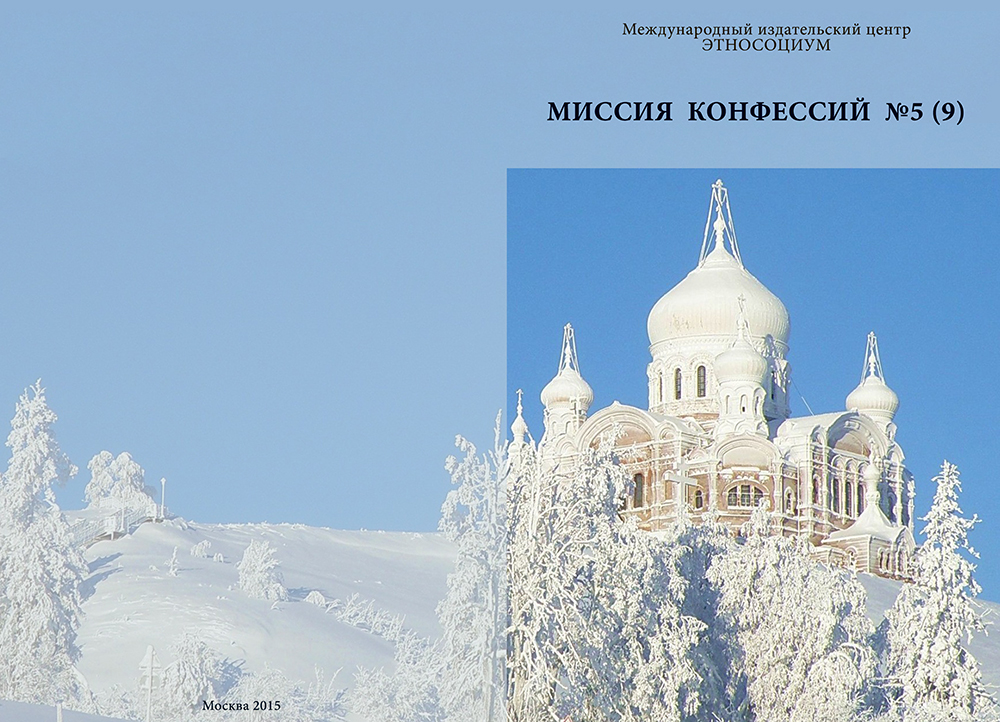Content
|
Orthodox Church
|
|
|
Vlasov V.I. Ideas about the soul
|
4
|
|
Khubulava G.G. The stages of physician’s spiritual evolution light of the Nikolai Pirogov’s religiosity
|
13
|
|
Islam: Past and Present
|
|
|
Matushanskaya Y.G. Jadid reform in the Tatar religious education at the end of the XIX - the beginning of the XX century
|
21
|
|
Dzutsev H.V., Hugaeva А.А., Dibirova A.P. The problem of religious extremism in the world sociological literature
|
29
|
|
Philosophy of Religion
|
|
|
In Cologne, the regular meeting of the Episcopal Assembly of the Orthodox in Germany
|
40
|
|
The Catholic Church today
|
|
|
Dannenberg A.N. The Catholic Church in Argentina: social mission in times of crisis
|
45
|
|
Abstracts
|
55
|
|
Authors
|
57
|
Abstracts
Khubulava G.G.
The stages of physician’s spiritual evolution light of the Nikolai Pirogov’s religiosity
This article analyzes the development of the religious views of the surgeon and public figure Nikolai Pirogov. Keywords: history of medicine, Pirogov, φάσις, religious quest.
Matushanskaya Y.G.
Jadid reform in the Tatar religious education at the end of the XIX - the beginning of the XX century
Muslim religious education which has its own history in our country plays an important role in the relations of the Tatar population of Russia with religious norms and values of Islam, how they are perceived and carried out. Jadidism is a social movement in the sphere of Tatar culture and religion which was focused on the reform of religious education. Education at the end of the XIX - the beginning of the XX century was the only channel of renewing of Islam. As opposed to Muslim conservatism the Jadid movement is reasonably called the Tatar religious liberalism. It was thanks to Jadidism that Islam stopped to be an obstacle of modernization of society. The Russian (European) Islam created as a result of the Jadid reforms is focused on progress and peaceful co-existence with other people that is especially actual nowadays.
Keywords: religious education, Islam, Tatar education, Jadidism, Ismail Gasprinsky, modernization.
Dzutsev H.V.
Hugaeva А.А.
Dibirova A.P.
The problem of religious extremism in the world sociological literature
This article is written on the materials of the modern world literature on the problem of religious extremism.
Keywords: post-industrial society, a Christian country, religious pluralism and religious tolerance, the traditional Muslim society, religious fundamentalism, insurgents, sin, self-identity, the emancipation of women in Western society, the sacred passwords Islam, the French «secularism» and Islam, sectarian conflict, confrontation line: «power-people», economic crisis.
Dannenberg A.N.
The Catholic Church in Argentina: social mission in times of crisis
The article discusses the activities of the Episcopal Conference of Argentina in the period of social and economic crisis of 2000-2002. It is concluded that in the period under consideration the church played the major mediating role in the resolution of the social conflict in the country, acting as a «third force», consolidating the various layers of Argentine society. However, as the level of social instability in Argentina declines, the government returned to the previous model of state-church relations in which the Catholic Church was deduced from the political process, leaving only humanitarian functions in the public space.
Keywords: Catholicism, Catholic Church, Latin America, Argentina, crisis, CELAM, Episcopal Conference.
Authors
Dannenberg A.N., Associate Professor of the department of foreign policy activity of the Faculty of National Security of the Russian Presidential Academy of National Economy and Public Administration, candidate of Historical Sciences.
Dibirova A.P., Candidate of Biological Sciences, a senior researcher at the North Ossetian Institute for Social Research Center of the Institute of Social and Political Studies of the Russian Academy of Sciences.
Dzutsev H.V., Doctor of Social Sciences, head of the North Ossetian Social Research Center, Institute of Socio-Political Studies, Head of the department of sociology and social processes of K.L. Khetagurov North Ossetian State University, Vladikavkaz.
Hugaeva А.А., Candidate of Sociological Sciences, assistant Professor of sociology and social processes of the K.L. Khetagurov North Ossetian State University, Vladikavkaz.
Khubulava G.G., Doctoral of the ethics department of philosophical faculty of St. Petersburg State University.
Matushanskaya Y.G., Candidate of Philosophical sciences, associate professor of the Department of Philosophy and History of Science of Kazan National Research Technological University.
Vlasov V.I., Ddoctor of legal Sciences, Professor.





